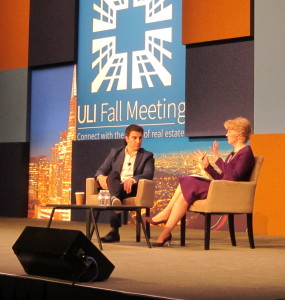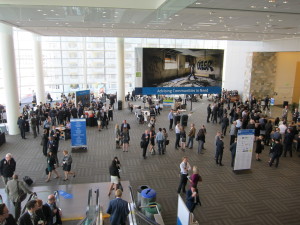By Sharon Simonson

SAN FRANCISCO—Thirty-four-year-old Brian Chesky, the millennial-generation business leader who co-founded Airbnb Inc., articulated neatly an early theme for the Urban Land Institute’s 2015 annual Fall Meeting in San Francisco: The rising public expectation as his generation’s influence supplants the baby boomers’ that urban landscapes be not just spaces, but environments for people to spend memorable time.
His rapidly growing home-sharing company wants to offer its travelers more than a room with a view, too, Chief Executive Chesky said. A home or a room—even a current inventory of 60,000 homes in Paris—is still “the limit of Airbnb today.”
“What I am really interested in is Airbnb 2.0. I want to continue to shift Airbnb toward experiences. We are redefining what it means to be a host, offering not just a home,” he said.
ULI invited Chesky to hear his thoughts on the effects that “disruptive” technology-based companies like Airbnb and Uber, the car-sharing service, are having on real estate. ULI is a global research and education nonprofit that promotes responsible land use and development to support sustainable communities. His comments preceded sessions on global trends and demographics. Constance B. Moore, chief executive of the former San Francisco apartment company BRE Properties Inc., interviewed Chesky.![]()
“What compels someone to be a host?” Moore asked.
Chesky, who, according to Forbes, is a multi-billionaire, said (completely without irony) that in his case, initially, it was as simple as needing to raise money to pay his San Francisco apartment rent. But that’s not why he continued to do it or why others do now, he said: “The number-one reason people host is not to make money. It’s the connection to other people. It’s not about spaces. It’s about people.”

It’s also not true, as some perceive, that hosts and guests skew “young,” he said: The average host is 39-years-old; the average guest is 34-years-old. “We have more hosts over age 60 than under age 25—and it makes complete sense,” Chesky told Moore. Hosts and guests also are both more likely to be women.
“That’s a surprise,” Moore said.
“People are surprised by that,” Chesky replied.
Airbnb operates in 191 countries with 1.7 million homes in more than 34,000 cities. Based on host reviews from the 70 percent of guests who leave them, the company recognizes as “super-hosts” the top 5 percent and weeds persistently from the bottom. Of the company’s 2,000 employees, a team of 250 focuses on “safety and trust,” he said. “They do a lot of work on the back end. We remove hosts every single day.”![]()
He recently spent time in Nairobi, Kenya, for an entrepreneur’s summit, “where a lot of people were my age,” he said.
“What did you learn from them?” Moore asked.
“What shocks me as I travel around the world is how similar we all are. I have the same conversations in every country,” he replied. About a third of the company’s business today is in the United States; the rest is international. Airbnb’s next big opportunity is China.
“How has your vision changed?” Moore asked.
“In October 2007, my vision was to pay rent and don’t get evicted,” Chesky replied, (perhaps this time with a little irony). “This wasn’t supposed to be a big idea. I had a mentor, and I told him about Airbnb, and he said, ‘Brian, I hope that is not the only idea you are working on.'”
“What has been your ‘ah-ha’ moment?” Moore queried.
“Do you mean generally?” he asked.
That, he said, related to the improbable fact that he found himself on his current perch.
His parents, both social workers when he was growing up in Albany, N.Y., never mentioned starting a business. The only entrepreneur he ever heard discussed at home was “Bob,” who operated a pizza parlor in his neighborhood. “I have great co-founders, and there were the right conditions for a new model around housing,” he said. “I am not extra- or uniquely gifted. My possibilities aren’t unique to me. No one growing up would say I would be doing what I am doing today. They were wrong, and I was wrong. We all have this potential in us.”